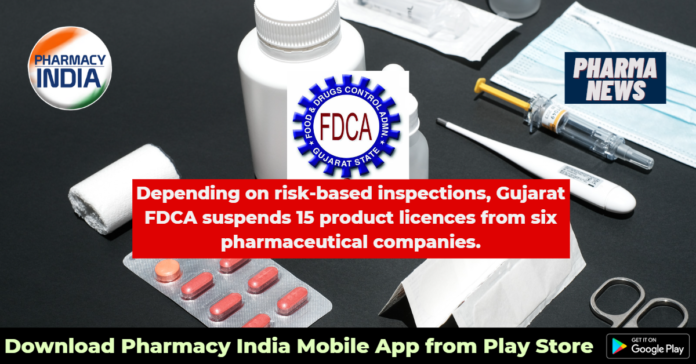Based on risk-based inspections, the Gujarat Food and Drug Control Agency (FDCA) has revoked 15 product licences from 6 pharmaceutical companies. Ahmedabad is where the majority of these businesses are based. The risk-based inspections discovered that some of the businesses providing commonly prescribed gastrointestinal medications and supplements had items that weren’t up to par (NSQ). Other products include oral rehydration salt (ORS), antibiotics such as amoxicillin for bacterial infections and azithromycin for colds, as well as antimalarial medications.
“Business can now only regain their product licences after submitting the stability data. These stability data investigations must be performed by law at the testing facility in Vadodara. In order to ensure patient safety, this may require the corporation to conduct additional study and reformulate the medication, according to Gujarat FDCA Commissioner Dr. H. G. Koshia. For the first time in India, risk-based inspections are being conducted, and NSQ medications have been reported from Gujarat, Himachal Pradesh, Madhya Pradesh, and Uttrakhand.
According to a recent announcement by the Central Drugs Standard Control Organization (CDSCO), 18 Indian pharmaceutical companies’ licences have been revoked as a result of risk-based inspections that were scheduled for December of last year. Following the World Health Organization’s (WHO) decision to hold Indian pharmaceutical companies accountable for exporting tainted medicines in response to the deaths of numerous children in Gambia and Uzbekistan, the CDSCO office planned to conduct extensive risk-based inspections across the entirety of India. A joint team of the state and central licencing authorities investigated 76 pharmaceutical companies in 20 states and U.S. territories. Over 203 pharmaceutical companies have been recognised by the CDSCO, and more than 25 have received show-cause warnings.
The amount of substandard samples from the respective producer discovered on the market over the previous three years is the basis for the risk-based inspection criterion. According to a senior CDSCO official, “the DCGI will carry out risk-based inspection on a large scale beginning from Himachal Pradesh and Sikkim based on the performance and condition of the states in terms of keeping a check on the substandard medications or products in the supply chain.
According to official sources, the majority of the pharmaceutical enterprises under government scrutiny are from HP (70), Uttarakhand (45), and MP (23). The 1945 Drugs & Cosmetics (D&C) Regulations’ current good manufacturing practises (cGMP) and good laboratory practises (GLP) form the foundation for the risk-based inspections. A manufacturer’s compliance with sanitation, hygiene, self-inspection, quality audits, prevention of cross-contamination, and bacterial contamination during production are audited during these inspections, which are carried out by the state drug licencing authorities and the DCGI, among other crucial areas.




